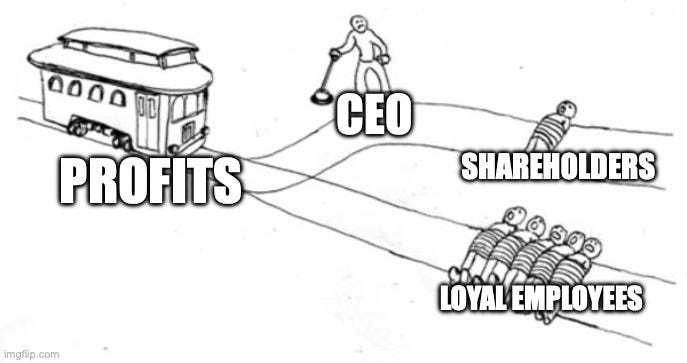It’s become a truism that businesses exist purely for profit
Ask anyone, especially in the US, and they’ll tell you that businesses exist to maximize profit. And legally speaking, a business is defined as for-profit venture. But whether profit is the only and ultimate purpose of a business, is largely up to the imagination of the business owner.
I’ll refer to the belief in business as a profit-maximizing entity as “the mythology of business”. Most people will use this mythology of business to explain all sorts things that happen in the world of work: hiring practices, monetization schemes, contract negotiation, investment strategies and the generally poor treatment of anyone who could be considered an employee.
Profits, Layoffs and Choice
One of the most recent demonstrations of this is in the public dialogue surrounding ongoing tech layoffs. What is particularly strange about layoffs in the technology sector is that each of these companies are bewilderingly profitable. Traditionally, many of us understood layoffs as the last ditch efforts of a dying company, a sign of economic conditions that had made it impossible for the company to turn a profit. But these layoffs are of a different sort. They seem driven, almost entirely, by a desire to maximize near-term profits ( or perhaps a long-term strategy to minimize one of the few remaining highly paid classes of employment. )
Traditionally, many of us understood layoffs as the last ditch efforts of a dying company
Many companies reported that they had “over-hired”, and layoffs were necessary to address “economic realities”. What each of these stated reasons have in common is blame on some external obligation. The implied obligation being profit - and taking into account the record-breaking profitability of these corporations - we can only assume the obligation is maximal profit.
Under this implied obligation, each executive had their hands tied. It wasn’t their choices that led to these layoffs. Nay, it wasn’t their choice to lay anyone off at all, it was the macroeconomic conditions. These executives were merely victims of the profit machine, beholden to shareholders and completely incapable of making any of the other dozen choices available to them. They are terribly pained to have to make these very difficult decisions, but they are beholden to a higher cause. They have duties to their shareholders and they must take responsibility for them.
Given that mishandling the lives of hundreds of thousands of people seems to have caused them so much distress, perhaps we should come to their rescue?
Profits as a floor
Imagine for a moment, that profits are simply a means to an end. What if profits are simply a condition required for a business to survive?
If you start a business selling bicycles, your purpose is to help cyclists find a bicycle that meets their needs. You only need to be able to do that in a way that allows you to cover the costs of providing that service. These costs include your wellbeing and the wellbeing of your employees.
But if, like many ambitious startup founders, you decide you are not in the business of selling bicycles, but instead of transportation, you can now expand your business empire beyond two wheeled vehicles to include: shoes, Heelys, skates, skateboards, wakeboards, buggies, horses with buggies, mustangs, pontoons, luftballons, planes, trains, and automobillions. There possibilities for growth are endless, and this is exactly what you tell your investors.
But what is the point of all this growth?
Imagine for a moment, that profits are simply a means to an end.
What if this business were just about selling bicycles? What if the owner of the bicycle shop just really liked talking to people about cycling? What if cycling was just a fun way to spend a Saturday afternoon with friends and family - and the bicycle shop helped make that a possibility?
Why do businesses exist?
Some banana led corporations have espoused the importance of focusing on customer needs. In fact, businesses often start when someone identifies an unmet need in the market that could also result in profit.
However, focusing on customer needs is not necessarily what businesses do in practice. The focus on customer needs is often its own means to an end, and that particular end is profits. This becomes clear when the growth driven by customer needs slows. Many incorporated entities will then move beyond the mere meeting of customer needs, toward something more like extraction: manufacturing customer needs and then squeezing as much value as possible from the customer population.
We see this when private equity takes over hospital systems and instead of improving service, it improves profits. Or when hungry people are advertised overpriced, suboptimal food as meal replacement options.
You may also notice this when trying to contact any customer service line only to find out that the agent on the other end of the line is under-resourced: juggling far too much work to be an adequate listener. And neither are they an effective advocate of your needs as a customer. On the contrary, in the name of profits, they are incentivized to close your case as quickly as possible. Often times, they are even enlisted to persuade you to work against your best interests: do not end that subscription, do not return that refund to your original form of payment. If you truly insist on having the company do right by you, you will be forced to make an economic tradeoff between the value of your time and the value of being right.
If instead, profits were the floor, a company could free itself and invest profits toward creating better outcomes for its workers and customers. As long as the company could drive a sustainable profit, one could justify any sort of extravagance aimed at meeting customer needs: paying workers to re-train, investing in environmental health and recovery, or just supremely excellent drive-thru experiences.
Perhaps the company could even have a meaningful identity, with unique goals and responsibilities toward the world.
The meaning of business
Act in such a way that you treat humanity, whether in your own person or in the person of any other, never merely as a means to an end, but always at the same time as an end.
—Immanuel Kant, Groundwork of the Metaphysics of Morals
Business is embedded deep within US culture. If we want to change the way people think about their lives, we need to change the way they think about business. So long as we continue to allow business to mean “the art and science of maximizing profits” - we will remain stuck in a worldview that devalues human connection and self-actualization (which itself, is an unmet market need, people are lonely). My intention with this blog is to examine ways of reframing business that focus on human flourishing as an end in and of itself.

References
Earth is now our only shareholder - Patagonia
Five measures of growth that are better than GDP
It’s a bad day to be a predatory subscription service
Kant: Groundwork for the Metaphysics of Morals
Let them eat Flakes: Kellogg’s CEO says poor families should consider ‘cereal for dinner’
Macroeconomic Changes Have Made It Impossible for Me to Want to Pay You
Our Epidemic of Loneliness and Isolation
Private Equity Investments in Massachusetts Health Care and State Policy Opportunities




